An interview with Jörg Jaksche, Thursday, December 7
Jörg Jaksche: 'There are no winners'
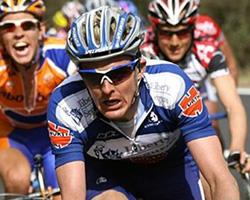 |
The past five months have been tormenting for Jörg Jaksche, the German cyclist who used to ride - and win - for Manolo Saiz's Liberty Seguros team. Ever since the count-down to the last Tour de France, where Jaksche's name was already on the start list, the 30 year-old has been fighting his own battle from his home in Austria, to clear his name which had been linked to Dr Eufemiano Fuentes in the so-called Operación Puerto doping scandal. Now that the rider from Ansbach, Germany, has finally had his case shelved by the Austrian cycling federation, Cyclingnews' Hedwig Kröner caught up with him to dicuss his side of the story.
"Some weeks ago, my attorney had received positive signals by the federation saying that, after studying the documents, they would not open proceedings against me," Jaksche was relieved to say. "Moreover, this decision had nothing to do with the fact that the Spanish judge in charge of the affair had ordered that the documents could not be used by the federations - they took that decision independently."
Jaksche, who continues to deny that he has used performance-enhancing drugs or methods, meanwhile admitted that he was in contact with Fuentes, who according to the investigation of the Guardia Civil was the instigator of a wide-spread blood-doping network based out of Madrid. "He has a two-year old child, who suffers from a particular form of cancer, and looked to make contact with me because my father is a renowned ophtalmologist," he explained. "We have specialised clinics in Germany, and he was just trying to get information from my father to save his child's second eye, because it had lost one already. So this was the kind of relation we had, but I have nothing to do with his alleged doping activities - if they are indeed true, which only the legal procedure can establish."
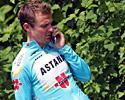 |
During the last months of relative inactivity, Jaksche was glad to be surrounded by his family and friends, who stood by him even though the cyclist was depicted guilty in the German media, and received anonymous threats by e-mail. "I'm very lucky to have a great circle of friends, which turned out to be faithful to me. They were all shocked by the situation, and most of them reacted like true friends and continued to support me. Of course it's difficult for them to handle seeing their friend in the newspaper, being treated like a criminal. My family, too, was wonderful."
The worst part of this period in his life was the helplessness, Jaksche said. "Before the Tour, I was confronted with what were supposed to be hard facts, and then, I didn't have any means to defend myself for five or six months. The federation didn't receive any documents for quite a while, so I couldn't do anything against the accusations."
As the Operación Puerto scandal unfolded, Jaksche was also increasingly under the impression that a number of mistakes had been made in the investigation, and that personal motivations played a significant role in the turn of events. "At first, everything seemed clear, but after a while, it became more and more blurred. I kept an eye on the press, for example, and noticed different styles of reporting: while some wrote in a neutral fashion, others seemed to engage in a personal anti-doping fight.
"The main problem is the credibility of the investigation report. At first, everybody thought it was all hard facts, but now several criminal procedures are under way in Spain, because of alleged falsification and illegal disclosure of documents."
In fact, Jaksche, along with seven other former Liberty Seguros riders, complained to the Spanish court that their personal medical data had been made public by the Spanish federation. The judge admitted the accusations to the procedure, as well as Manolo Saiz' complaint against the against the director of the Superior Council of Sports, Rafael Blanco. Still, the German is angry.
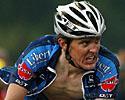 |
"In this kind of situation, there are no winners. People have lost their jobs, the credibility of the cyclists was destroyed... and even if we are cleared, the ProTour teams may not take us any more, because the sponsors may not want that kind of image. I mean, I was fourth in the world rankings before all of this started, but I don't know if I'll be racing again next year," he added, feeling stripped off his value as an athlete.
While Jaksche didn't completely discard supplying authorities with a DNA sample to prove his innocence, he also had arguments against the idea, which to many seems to be an important tool in the fight against blood doping in the future. "DNA tests are no doping tests. So even if a bag containing the blood of one of the accused had been found in Fuentes' apartment, that doesn't mean that the rider had the intention of enhancing his performance. It only means that a certain amount of blood was given. So it doesn't really make sense to me, because it would only translate into a new legal procedure, which the athlete would win. If someone goes into a shop and buys a knife, you can't convict him of planned homicide, either."
Jaksche's attorney, Michael Lehner, put it this way: "Submitting a DNA sample would reverse the burden of proof on which our legal system is based on. The notion 'in dubio pro reo' [innocent until proven guilty – ED.] would be undermined. The law foresees that the prosecution must prove its accusations to be true - it is not for the accused to prove that he is innocent."
But the fight against doping is important to his client, who thought that out-of-competition anti-doping tests should be generalised for all of the peloton. "We can only move forward if all riders, and not only the first 30 or 50 in the world rankings, are subject to complete testing," Jaksche continued. While out-of-competition testing is said to be completely randomised under UCI rules, the cost of the procedure is rumoured to cause only a certain selection of the athletes to be tested.
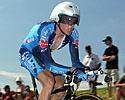 |
As to the continuation of his career, the German remained hopeful, even though a number of difficulties lie ahead of him and his former teammates. Team manager Manolo Saiz, himself implicated in the affair, still owns the managing company Active Bay, to which Jaksche is contractually bound until the end of 2007. The company is still operative, as the German confirmed that he had received his monthly pay without a day's delay these past months. Astana, the Kazakhstani conglomerate which took over sponsorship from Liberty Seguros, may have publicly turned its back on Saiz, but all contracts - including the ProTour license of Active Bay - are still valid. "To my knowledge, Active Bay has a contract with Astana through 2008," he said. According to Jaksche, the situation around his team and the one created by Marc Biver and Tony Rominger in Switzerland, is far from clear. The Swiss Astana team has already presented its roster to the UCI, including several riders of the former Liberty Seguros team, but these athletes are said to be still under contract with Active Bay.
"At the moment, nobody really knows how this is going to evolve. If the team breaks apart - which I don't hope for - I might not get a slot in any other team, because of the negative image I now have even if I'm innocent. But if I end up without a job, I have an idea of who to ask for damages". Jaksche is determined find the people responsible for the illegal leaks of personal information, which in his opinion led to his current loss of credibility, and added that many riders linked to Spanish investigation felt the same way. "It's a terrible situation. Riders who have never done anything wrong in their career might now suddenly become unemployed, just because they are on some kind of list which made them lose their reputation. I still have hope - Basso did get taken on by Discovery Channel, because Bruyneel told it like it is. But I haven't thought about what I would do if this really means the end of my career."
Jaksche also criticised the attitude of certain persons within the sport: "I'm annoyed by people who say that Basso's return to cycling is bad news, because it supposedly sheds a negative image on the sport. Especially Jens Voigt, who earned a lot of money through prize money from Basso, shouldn't advocate this like he does. How can he pick on Basso - or any other rider implicated - like this, when the other person is already in big trouble, and yet cash in all this supposedly dirty money? That's hypocritical! If he was being sincere he wouldn't accept the rather important sum of money that Basso earned him through his victories and placings in the last three years, and donate them to the fight against doping.
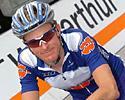 |
"To my knowledge, the only teams who have actively done something are CSC and T-Mobile, by creating their own anti-doping plan," he added, saying that the team's managements also had their part of responsibility for cycling's loss of credibility.
Getting back his own good reputation is Jaksche's biggest personal concern, but he was afraid he lacked the tools. "All I can do is be available for anti-doping tests every day, every hour. I can't do any more than that for my personal credibility. If people still don't believe me, I must live with that, and if people don't believe in cycling any more... I can't do anything about it. The cyclists implicated in the Puerto affair would only get final clearance if they could prove their innocence before the CAS - but in order to get there, they first have to go through a federation procedure, and the federations are saying they don't have enough evidence to open procedures! This is what's so frustrating about this situation."
Still, the German is convinced that cycling is a precursor in the fight against doping, compared to other sports. "There might not be as much positives in other disciplines, but then again, they don't have the same testing procedures. The fact that so many cheaters are caught in cycling is therefore good news, because it means that the testing methods, which are constantly being improved, actually work. So I think we are headed into the right direction.
"Take for example the world's number one sport: soccer. Do we prosecute every player that simulates a foul or plays a foul, like in the case of Jan Ullrich, who now has to defend himself against the accusation of fraud in a civil proceeding? Where's the difference? That's cheating, too! It's about the personal advantage one can get in a competition. Yet, we don't make such a fuss about that kind of cheating, even if - or because - it is a sport where much more money is at stake than in cycling. If that particular foul would be decisive in the champions league, it would decide over millions of Euros. As many people say, sport is a reflection of our society..."

